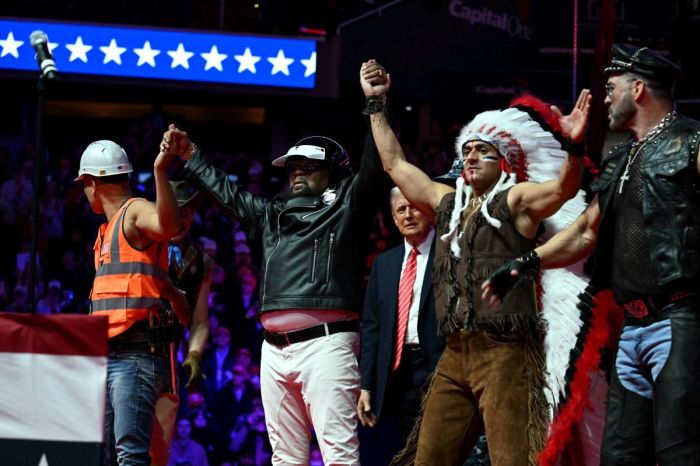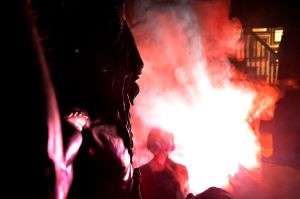The disturbing real meaning of Village People's YMCA

I was born in 1969; the year of Woodstock, the vicious Charles Manson murders, and the Stonewall Riots. My early cohort of Generation X were amongst the first Americans to grow up entirely in a world that would fully experience the impact of the Sexual Revolution.
As a result of the social and cultural upheavals of the 1960s, everything seemed to change in the following decade:
- The introduction of the birth control pill in 1960 ushered in the age of sexual freedom
- The 1965 Supreme Court case Griswold v. Connecticut struck down all prohibitions against contraception because they allegedly violated an individual’s privacy
- The abandonment of the Hayes Code in the late 1960s marked the introduction of sexual explicitness in motion pictures and the widespread distribution of pornography
- The philosophy of “free love” that reached its apogee during the “Summer of Love” in 1967 San Francisco went mainstream
- The socially accepted idea of cohabitation or “living together” was initiated
- Women increasingly joined the workforce
- Divorce became commonplace
- The introduction of the “latchkey kid” who returned to an empty home, and was left alone with the television
- Most significantly, abortion was legalized in 1973
- And, during that same pivotal year — homosexuality was declassified as a mental disorder by the American Psychiatric Association
That was the world I grew up in. Playboy magazines were stacked in the waiting area at the local barbershop, the most popular TV shows (including “Three’s Company,” “Soap,” and “Maude”) openly explored the once-taboo topics of homosexuality, and the immensely popular disco phenomena developed out of the gay dance clubs of New York City, Los Angeles and San Francisco.
The first record I ever owned was “Cruisin’” by Village People. Released in 1978, the album included a song that would become an international hit: “YMCA.” Like the group's other efforts, “Cruisin’” was filled with sexual suggestion and double entendre.
Starting with the album title itself, cruising entered the lexicon of American gay slang in the 1970s as a term describing the urban homosexual male practice of seeking out sexual partners in public spaces such as discotheques, theaters, or public restrooms.
One of the most popular cruising locations for gay men during the 1960s and '70s was the YMCA. Hence, at the time, the song “YMCA” was understood as describing the sexual initiation of a young man into homosexuality. From the disturbing, but authoritative book Take the Young Stranger by the Hand: Same-Sex Relations and the YMCA: “The Village People song 'YMCA' has long been recognized with the gay community as a campy (if coded) description of the YMCA as a gay sexual arena …”
As a pre-teen boy, much of the song’s subtext went over my head. But I knew that I was drawn to the deep male voices, the caricatured masculine persona of the group’s members, and the sense of comradery that the Village People appeared to embody. For an alienated, depressed, and confused young boy, the lyrics of the song — which beckoned to someone just like myself, felt incredibly personal.
The Village People was deliberately designed to attract a gay male audience by having each member represent a certain “gay” sexual fantasy: the cop, a military man, a Native American, a construction worker, a cowboy, and the ubiquitous gay leather man. While the lead singer and co-songwriter for some of their singles (who portrayed the policeman) was a heterosexual, the rest of the group were all gay men.
Included in the Village People’s first album was the song “Fire Island”: a homage to the gay beach resort near New York City that was also the shooting location for the 1971 gay pornographic movie “Boys in the Sand,” which became the first widely distributed gay porn film in history. They would again celebrate the happiness and freedom to be found at a gay resort in the song “Key West” from 1978. Curiously, also in 1978, gay porn actor Casey Donovan, the star of “Boys in the Sand,” opened a boarding house for gay men in Key West. He would later die of AIDS at age 43.
For the most part, I was one of the young men who heard the siren song of the Village People and when I turned 18 years old, I traveled to San Francisco hoping to find the magical world they described in “San Francisco.” In a sense, they didn’t lie, it was a truly fascinating and exhilarating place. And for a kid who grew up thinking he never belonged, feeling rejected by men, and wondering where I could ever find a place to call home — I thought I’d awoken in a dream. Suddenly, the “Macho Man” that the Village People sang about, paid attention to me. Exactly 10 years had passed since the Village People’s landmark album “Cruisin’” had been released. And, since then, everything had changed.
As the gay Boomer Generation had disastrously found out, sexual freedom came at a heavy price. Gay San Francisco journalist Randy Shilts would fearlessly describe in his ground-breaking book And the Band Played On, that by the late 1970s, when disco culture was at its zenith, doctors in New York City began to notice that gay men were becoming habitually infected with an unlimited series of venereal diseases. According to Shilts: “In San Francisco, incidence of the ‘Gay Bowel Syndrome,’ as it was called in medical journals, had increased by 8,000% after 1973.” Although this new reality was scary, and I was scared, I believed that I had to make the best of it.
Where else could I go?
The 1978 “Macho Man” album included the single “I Am What I Am.” Cowritten by Morali, Victor Willis (the original lead singer) and two others, the song appears to be one of the first pop-culture references to what would become the “born gay” theory of homosexuality. Decades before Lady Gaga gave incredible impetus to the idea that homosexuality is an inherent inborn trait with her worldwide hit “Born This Way,” the Village People sang these words:
“People have the right to live with who they please
People have the right to live there happily
No one has the right to choose my love for me
I was born free, I did not choose the way I am
I did not choose the way I am, I said I am what I am, This is my fellow man…”
Many would take this message seriously. I believed that this was the way I had been born; and for the more religious amongst us — the way God made me. But it was all a lie. Even the highly gay-affirmative American Psychological Association had to admit that: “There is no consensus among scientists about the exact reasons that an individual develops a heterosexual, bisexual, gay or lesbian orientation.” But can those who perpetuated bad theories be held responsible for all the outcomes? I do not know. Could Karl Marx, when he wrote The Communist Manifesto, envision the atrocities that would later be committed by Lenin, Stalin, and Mao? I think he certainly bears some responsibility. And so, the Village People are at least partially responsible for the hedonistic culture of sexual excess that they celebrated and profited from.
Since the epidemic began, an estimated 311,087 gay men with an AIDS diagnosis have died in the US.
But even the Village People who heralded the advent of a new sexually adventurous age understood the repercussions of the gay epidemic they had unwittingly helped to unleash. Therefore in 1985, they released an album with a “safe-sex” theme titled “Sex on the Phone.” But it was too little, too late, and would prove to be Moreli’s last Village People album. In addition, the new lead singer of the group, Ray Stephens, would die of AIDS at age 35 in 1990.
Although their music had persisted, the group had seemed to have fallen into near obscurity over the years. Then, during Donald Trump’s re-election campaign for president, the song “YMCA” was often played at his rallies. Initially, the group asked that Trump stop using the song; then, when "YMCA" began to be increasingly downloaded, becoming a hit once again, things changed. Willis stated: “Trump’s use of ‘Y.M.C.A.’ has greatly benefited the song. For example, when Trump started using ‘Y.M.C.A’ the song shot back up to #2 on Billboard’s digital chart.”
Next, there occurred a strange sort of historical revision; apparently, the consensus for the past 40 years about the meaning of “YMCA” was incorrect according to Willis. His reinterpretation might have been influenced by the song's newly founded popularity amongst Trump’s more conservative base. However, the song’s other co-writer, as well as its producer, is no longer here to offer his opinion because Jacques Morali died of AIDS at age 44 in 1991. It’s sadly ironic that one of the few heterosexuals who was originally involved in the entire Village People project is the person here — still making a profit.
Well, some might say: who cares? The song is often played at weddings, high-school pep rallies, and numerous sporting events, and is generally viewed as a lighthearted party song. In my opinion, this is a form of collective memory-holing. As the horrors of AIDS start to drift into the recesses of the communal consciousness, the arbiters of the sexual revolution are looked upon as innocent reminders of a bygone age. Until a few former Playboy “playmates” bravely revealed the abuse and humiliation they endured under the auspices of Hugh Hefner, Playboy Magazine was seen in the same light — as a form of harmless entertainment.
In terms of the Village People, that is nowhere more evident than in the inspiration for the “leather man” character in the group. According to gay writer and historian Jack Fritscher, Jacques Morali drew his inspiration for the “leather man” from the denizens of the notorious gay BDSM leather sex club the Mineshaft in New York City. It was no accident when the music video for YMCA was filmed directly in front of another infamous New York City gay leather bar – The Ramrod. What often happens in modern American culture is that fringe and often subversive cultures are somewhat diluted and then repackaged and sold. This happened with rap music during the 1990s, and it occurred with homosexuality and the Village People. In the process, attitudes and minds are changed. In 1997, only 27 percent of Americans approved of same-sex marriage; in 2021, it was 70%.
Since the 1970s, the AIDS epidemic reached its worst phase in the early-90s then precipitously decreased in terms of mortality due to the introduction of retrovirals. However, HPV, anal cancer, and Hepatitis C & B remain endemic in the gay male community. And since the 1970s, numerous studies have found that a disproportionate number of gay men experienced same-sex molestation as children. With homosexuality not serving as a course of comradery, but trauma bonding. Gay disco pioneer Sylvester, before his early death due to AIDS at age 41, revealed that he had been sexually abused by a man when he was 8 years old. So much suffering.
And I was there. And I saw too much. I lost friends. And I will never forget them. Many of them were like me. The survivors of childhood sexual abuse, neglect, mercilessly teasing and bullying by male peers, who sought some sort of self-realization and belonging with gay men. Oftentimes, they found revictimization, false promises, and disease or death. For many, the introduction into this world was the Village People and its music.
For me, instead of YMCA sounding like a raucous celebration, it’s a funeral dirge. Thousands from that era went to an early grave and we must not forget.
Originally published on Sons of St. Joseph.
Joseph Sciambra has written extensively concerning the real-life issues of pornography, homosexuality, and the occult. His articles have been published by LifeSiteNews, The Stream, and First Things. He received his BA from the University of California at Berkeley in Art History and his MA from Sonoma State University. His blog and podcast can be found at: josephsciambra.com




























